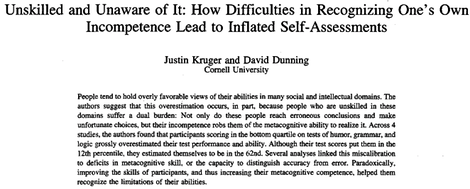Marc Abrahams's Blog, page 599
February 6, 2012
Pad or Publish-But-Perish
Richard Van Noorden writes, in Nature, about a study published in Science:
Researchers feel pressure to cite superfluous papers
One in five academics in a variety of social science and business fields say they have been asked to pad their papers with superfluous references in order to get published.
The figures, from a survey published today in Science [Wilhite, A. W. & Fong, E. A. Science 335, 542–543 (2012)], also suggest that journal editors strategically target junior faculty, who in turn were more willing to acquiesce.
The controversial practice is not new…
(Thanks to investigator Marilyn Keele for bringing this to our attention.)

Interview with Dunning about the Unskilled and Unaware
Filmmaker/writer Errol Morris interviews Ig Nobel Prize winner (prize for psychology, 2000, for his and Justin Kruger's report "Unskilled and Unaware of It: How Difficulties in Recognizing One's Own Incompetence Lead to Inflated Self-Assessments") David Dunning, in the New York Times. The interview begins:
The Anosognosic's Dilemma: Something's Wrong but You'll Never Know What It Is
I called David Dunning at his offices at Cornell:
DAVID DUNNING: Well, my specialty is decision-making. How well do people make the decisions they have to make in life? And I became very interested in judgments about the self, simply because, well, people tend to say things, whether it be in everyday life or in the lab, that just couldn't possibly be true. And I became fascinated with that. Not just that people said these positive things about themselves, but they really, really believed them. Which led to my observation: if you're incompetent, you can't know you're incompetent.
ERROL MORRIS: Why not?
DAVID DUNNING: If you knew it, you'd say, "Wait a minute. The decision I just made does not make much sense. I had better go and get some independent advice." But when you're incompetent, the skills you need to produce a right answer are exactly the skills you need to recognize what a right answer is. In logical reasoning, in parenting, in management, problem solving, the skills you use to produce the right answer are exactly the same skills you use to evaluate the answer. And so we went on to see if this could possibly be true in many other areas. And to our astonishment, it was very, very true….
Dunning and Kruger's study:

Mathematicians' views on delicate matters: local quivers
Mathematicians, as a group, are unafraid to confront almost any question (so long as it pertains at least hypothetically to mathematics) — even questions about delicate, local matters. Here's an example, presented in the form of a treatise:
"Local quivers and stable representations," Jan Adriaenssens and Lieven LeBruyn [pictured here, possibly in the act of contemplation]," Communications in Algebra, 31:1777–1797, 2003.

February 5, 2012
Ennui Amongst Chinese Librarians
 It has been observed that librarians – specifically Chinese university librarians – can sometimes suffer from Ennui (a.k.a. boredom). Here is a partial compendium of the academic literature on the subject (2005 – 2008)
It has been observed that librarians – specifically Chinese university librarians – can sometimes suffer from Ennui (a.k.a. boredom). Here is a partial compendium of the academic literature on the subject (2005 – 2008)
• On the Occurrence and Elimination of University Librarian's Professional Ennui (2005)
• On the Causes and Countermeasure of the Career Ennui of Campus Librarians (2006)
• Analysis of Causes of University Librarian Vocational Ennui and Countermeasures (2007)
• On the Cultural Cause and Countermeasures of Occupational Ennui of Librarians (2008)
• On the Regulating Action of Librarian's Self Concept to Vocational Ennui (2008)
Fortunately, the latest paper spells out a possible ameliorating strategy towards countering this troubling and evidently pernicious manifestation.
• Happy Work Is the Best Cure for the Burnout of the Librarians (2009)
(photo courtesy official China news agency, Xinhua)

Shooting a Football Fan with a Signal Rocket
A game of football can, even after the fact, generate forensic interest. A case in point:
"Singular Case of Shooting a Football Fan with a Signal Rocket," M. Kobek, K. Rygol, C. Chowaniec, A. Nowak, Forensic Science International, Volume 147, Supplement, 17 January 2005, Pages S43-S44. The authors, at the Medical University of Silesia in Katowice, Details::
"The authors present a very rare case of fatal injuries resulting from shooting a parachute signal rocket with a hand operated launcher of signal pistol kind by pseudo-football fans…. Inspection of the victim's trousers showed an 'unshapely tear with molten selvages in the perineal region and also a torn seam in the duteal region'. From the expert's opinion on physicochemical examinations it appeared that the above-mentioned event was caused by shooting a parachute signal rocket from a 'hand operated launcher' being the body of a cartridge (without the use of a signal pistol). Both initiation of the cartridge action and its consequences occurred in the victim's trousers (according to the expert's opinion there was no tangible evidence that the cartridge was shot outside)."
BONUS: The blogger known as Skeptical Scalpel alerts us to this recent case. The State Journal (which calls itself "West Virginia's only business newspaper) reported on February 3:
Marshall student sues Alpha Tau Omega fraternity over bottle rocket incident
A Marshall University student is suing the Alpha Tau Omega fraternity after a fellow fraternity member allegedly shot a bottle rocket out of his anus.
Louis Helmburg III filed the suit in Cabell County Circuit Court against the fraternity and member, Travis Hughes, following incidents at a May fraternity party.
Helmburg claimed several underage party attendees, including Hughes, were drinking.
"Defendant Hughes was highly intoxicated on this date and time, and decided in his drunken stupor that it would be a good idea to shoot bottle rockets out of his anus on the ATO deck," the suit stated.
However, this plan quickly went awry….

February 4, 2012
Whack on the side of head spurs creativity
Today's Stimulating Medical Publication Title of the Day is:
"Whack on the side of head spurs creativity," D. Chase, OR Manager, 1992 Feb;8(2):16-7. The authors is, or was, at the Massachusetts General Hospital, Boston.
[NOTE: The "OR" here is an acronym for "Operating Room"]

February 3, 2012
Conceivably surprising: Drunken anger
Another conceivably-surprising headline, in a press release published in Science Daily:
People Who Suppress Anger Are More Likely to Become Violent When Drunk
ScienceDaily (June 22, 2010) — A new study published in the journal Addiction reveals that drunkenness increases the risk for violent behaviour, but only for individuals with a strong inclination to suppress anger….
The study, which will conceivably surprise someone, is:
"Alcohol, suppressed anger and violence," Thor Norström and Hilde Pape [pictured here], Addiction, volume 105, issue 9, pages 1580–1586, September 2010. The authors, at Stockholm University and the Norwegian Institute for Alcohol and Drug Research explain that:
"Alcohol use may be related causally to violence, but the effect of drinking is confined to individuals who are inclined to suppress their angry feelings."

Piano-induced near-trauma, for testing purposes
Roberts Musical Restorations restores instruments. They also posts videos that may be instrumental in getting people to see instrumental possibilities. The two videos here will, if viewed in order, (1) frazzle your nervous system and then (2) calm what's left of it.
First this. "DEATH WALTZ CANT BE PLAYED ON A PIANO!! The problem is that the song was programmed incorrectly and just past the middle of the song there are too many overlapping notes . The computer compensates but the piano cannot. I have tried to re-write it somewhat but does not have the same effect. If someone actually wrote the music to play on a piano like Circus Gallop it would play but they basically just wrote the song for the computer to play and cannot be played on a real piano. 'sorry'."
Then this. "This is a Wurlitzer style C with a bell unit added. We have just completed a total restoration and this beautiful Orchestrion is now for sale. The case has a "Silver Fox" finish in which is rare for this unit. This Orchestrion plays 65 note piano, 38 Violin pipes, 38 Flute pipes double mouthed, Bass & snare drum, triangle and a 14 note bell unit."
(HT Mark Dionne, BoingBoing, Reddit)
BONUS: Two humans attempt to play Circus Galop:

The Hooman kiss-transmission robot
 Videos don't lie, it is said (though said seldomly). Here are videos of the kiss-transmission robot and its relatives. The man behind (or between?) the kiss is said to be Hooman Samani [pictured here], Hooman being at the National University of Singapore. He lists among his publications:
Videos don't lie, it is said (though said seldomly). Here are videos of the kiss-transmission robot and its relatives. The man behind (or between?) the kiss is said to be Hooman Samani [pictured here], Hooman being at the National University of Singapore. He lists among his publications:
H. A. Samani, A. D. Cheok, N. Fernando (2011) An Affective Interactive Audio Interface for Lovotics . In ACM Computers in Entertainment, CIE, Volume 9, Issue 2, July 2011. Presented in International Conference on Advances in Computer Entertainment Technology, ACE 2010.
- H. A. Samani, A. D. Cheok (2011) From Human-Robot Relationship to Robot-Based Leadership . In 2011 IEEE International Conference on Human System Interaction, HSI 2011.
Here's Hooman's "Reinforcement Learning of Lovotics Robot":
…and Hooman's "Mini-Surrogate: Communication via Miniature Robots":
(HT Josh Kroll)

Responses to real and imitation (termite) corpses, underground
Corpses are pretty darned attractive, in a sense, to certain individuals, under certain conditions,as is made clear in this study:
"Evidence of cue synergism in termite corpse response behavior," Michael D. Ulyshen and Thomas G. Shelton, Naturwissenschaften, Volume 99, Number 2, 89-93. The authors report:
Subterranean termites of the genus Reticulitermes are known to build walls and tubes and move considerable amounts of soil into wood but the causes of this behavior remain largely unexplored. In laboratory assays, we tested the hypothesis that Reticulitermes virginicus (Banks) would carry more sand into wooden blocks containing corpses compared to corpse-free controls. We further predicted that the corpses of predatory ants would elicit a stronger response than those of a benign beetle species or nestmates. As hypothesized, significantly more sand was carried into blocks containing corpses and this material was typically used to build partitions separating the dead from the rest of the colony. Contrary to expectations, however, this behavior did not vary among corpse types. We then tested the hypothesis that oleic acid, an unsaturated fatty acid released during arthropod decay and used by ants and other arthropod taxa in corpse recognition, would induce a similar building response in R. virginicus. To additionally determine the role of foreign objects in giving rise to this behavior, the experiment was carried out with and without imitation corpses (i.e., small glass beads).
(Thanks to investigator Tom Gill for bringing this to our attention.)

Marc Abrahams's Blog
- Marc Abrahams's profile
- 14 followers


























